
Ecologies
Scope & Guideline
Championing open-access research to inspire ecological solutions.
Introduction
Aims and Scopes
- Ecological Interactions and Biodiversity:
Research on the interactions between species, including competition, predation, and symbiosis, and their impacts on biodiversity and ecosystem functioning. - Impact of Climate Change on Ecosystems:
Studies assessing how climate change affects species distributions, ecosystem services, and overall ecological balance, emphasizing the urgency of adaptive management strategies. - Microbial and Soil Ecology:
Exploration of microbial communities and their roles in nutrient cycling, soil health, and plant interactions, highlighting the importance of soil ecology in ecosystem management. - Conservation and Restoration Ecology:
Research focused on conservation strategies and restoration practices aimed at preserving biodiversity and restoring degraded ecosystems. - Applied Ecological Research:
Practical applications of ecological research to address environmental issues, including pollution, habitat management, and sustainable agriculture.
Trending and Emerging
- Climate Resilience and Adaptation Strategies:
Increased focus on how ecosystems can adapt to climate change, along with the development of resilience strategies, is becoming a critical theme as global climate impacts intensify. - Microbiome and Soil Health Research:
A growing interest in the role of microbiomes in ecosystem health and their interactions with plant systems is evident, highlighting the importance of microbial ecology. - Human-Wildlife Interactions and Conservation:
Research examining the effects of human activities on wildlife and ecosystems is trending, particularly in urban environments and areas of human encroachment. - Technological Advances in Ecological Research:
The use of advanced technologies such as remote sensing, machine learning, and big data analytics to study ecological patterns and processes is increasingly prevalent. - Ecological Restoration Practices:
Emerging studies focus on innovative restoration techniques and their effectiveness in various ecosystems, reflecting a commitment to practical conservation solutions.
Declining or Waning
- Traditional Species Inventory Studies:
Research focused solely on cataloging species diversity without addressing ecological interactions or broader environmental impacts is less frequently published, as the field moves towards integrative and functional approaches. - Basic Ecological Theory without Application:
Papers that discuss ecological theories without applying them to real-world scenarios or contemporary issues are becoming less common, as the journal emphasizes applied and practical research. - Single-Sector Studies:
Studies limited to a single ecosystem or sector (e.g., only terrestrial or marine) are declining in frequency, as interdisciplinary and cross-ecosystem research gains prominence.
Similar Journals

ACTA OECOLOGICA-INTERNATIONAL JOURNAL OF ECOLOGY
Connecting Scholars to Transform Ecological PracticesACTA OECOLOGICA-INTERNATIONAL JOURNAL OF ECOLOGY, published by Elsevier, stands as a prominent platform for disseminating innovative research in the diverse field of ecology. Operating since 1983 and continuing to make significant contributions into 2024, this journal features critical studies that advance our understanding of ecological systems, behaviors, and conservation efforts. With an impressive Q2 ranking in both the ecology and nature conservation categories, it exemplifies high-quality scholarship, reflected in its Scopus rankings—#74 in Environmental Science and #254 in Agricultural and Biological Sciences. Researchers, professionals, and students in the field are invited to explore the latest findings and methodologies that address pivotal ecological issues. As a journal committed to fostering academic collaboration, ACTA OECOLOGICA is essential for anyone dedicated to enhancing their comprehension of ecological dynamics and advancing sustainability practices globally.
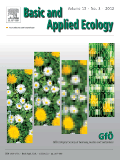
BASIC AND APPLIED ECOLOGY
Transforming ecological knowledge into practical solutions.BASIC AND APPLIED ECOLOGY, published by Elsevier GmbH in Germany, stands out as a premier journal in the field of ecology, evolution, behavior, and systematics. With its ISSN 1439-1791 and E-ISSN 1618-0089, the journal enjoys a distinguished reputation, evidenced by its classification in the Q1 category for Ecology in 2023 and impressively ranking #89 out of 721 in this domain according to Scopus. Since its inception in 2000, it has served as a vital platform for disseminating high-quality research that bridges theoretical insights and practical applications in ecology. Researchers, professionals, and students alike can look forward to the latest findings that not only foster a deeper understanding of ecological processes but also inform sustainable practices crucial for our environment. As the journal continues its journey through to 2024, it remains committed to advancing ecological knowledge and supporting innovative research in an ever-evolving field.

Ecosistemas
Fostering biodiversity insights and ecological innovation.Ecosistemas is a prominent Open Access journal published by the ASOCIACION ESPANOLA ECOLOGIA TERRESTRE, specializing in the field of ecology. Since its inception in 2001, it has dedicated itself to advancing ecological knowledge and research, fostering an inclusive platform for the dissemination of cutting-edge studies that span ecological interactions, sustainability, and biodiversity. The journal, based in Spain, has established its reputation with notable rankings such as Q3 in the field of Ecology and Q4 in Ecology, Evolution, Behavior, and Systematics, reflecting its commitment to quality research. With a Scopus Ranks position placing it in the 40th and 37th percentiles for its categories, Ecosistemas is integral to the academic community, serving researchers, professionals, and students alike. It provides a vital resource for those seeking to understand ecological dynamics and environmental challenges, facilitating open access to important findings and discussions that shape the future of our ecosystems.
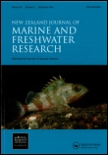
NEW ZEALAND JOURNAL OF MARINE AND FRESHWATER RESEARCH
Diving Deep into the Science of Aquatic EnvironmentsNEW ZEALAND JOURNAL OF MARINE AND FRESHWATER RESEARCH, published by Taylor & Francis Ltd, stands as a distinguished platform for the dissemination of innovative research in the realms of aquatic science and ecology. With an ISSN of 0028-8330 and E-ISSN 1175-8805, this journal has been curating significant scientific contributions since its inception in 1967, continuing through to 2024. Recognized in the Q2 category across multiple relevant fields—including Aquatic Science, Ecology, and Water Science—this journal ranks notably in Scopus, with a 74th percentile for Ecology, Evolution, Behavior and Systematics, highlighting its impact and relevance within the scientific community. Though not an open-access publication, its rigorous peer-reviewed articles offer insights that resonate with researchers, professionals, and students who are passionate about advancing our understanding of freshwater and marine ecosystems. By fostering a collaborative space for ecological and environmental inquiries, the NEW ZEALAND JOURNAL OF MARINE AND FRESHWATER RESEARCH is essential for those aiming to contribute to the vital conversations around biodiversity, conservation, and sustainable management of aquatic resources.
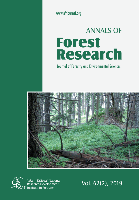
Annals of Forest Research
Empowering knowledge in forestry and plant sciences.Annals of Forest Research is a peer-reviewed journal dedicated to advancing knowledge in the fields of forestry, ecology, and plant sciences. Published by EDITURA SILVICA in Romania, this journal has been an open access publication since 2008, providing a platform for researchers to share their insights and findings with a global audience. The journal operates under a rigorous selection process, reflected in its positioning within the Q2 category in Forestry and Q3 in both Ecology and Plant Science as of 2023. With Scopus rankings indicating a solid percentile among its peers, Annals of Forest Research continues to play a vital role in disseminating innovative research and fostering scholarly dialogue. Researchers, professionals, and students are encouraged to explore its diverse range of articles, which address both foundational and contemporary issues in forest management and environmental sustainability, contributing to the sustainable use and preservation of forest ecosystems.

RUSSIAN JOURNAL OF ECOLOGY
Illuminating the Path to Sustainable Ecological SolutionsRUSSIAN JOURNAL OF ECOLOGY, published by PLEIADES PUBLISHING INC, stands as a critical resource within the field of ecology, offering an array of research insights that span various ecological topics. With an ISSN of 1067-4136 and an E-ISSN of 1608-3334, this journal has been consistently disseminating knowledge since its inception in 1996, now converging towards 2024. Despite its current Q4 ranking in the Ecology, Evolution, Behavior and Systematics category, the journal has carved out a niche in the publication landscape, particularly for scholars focused on the rich and diverse ecological phenomena of Russia and surrounding territories. The journal aims to foster interdisciplinary collaboration and innovation by providing a platform for the dissemination of high-quality research. While it currently lacks open access options, readers can expect in-depth studies and analytical discourses that contribute meaningfully to the global understanding of ecological systems. With an impressive Scopus rank, this journal remains an important outlet for researchers, professionals, and students committed to advancing ecological science.
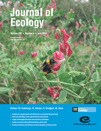
JOURNAL OF ECOLOGY
Pioneering research in ecology and plant science.JOURNAL OF ECOLOGY, published by Wiley, stands as a leading publication in the field of ecology, evolution, behavior, and plant science, currently positioned in the prestigious Q1 quartile across these categories. Established in 1976, the journal has consistently provided a platform for innovative research and critical discourse related to ecological patterns, processes, and interactions. With its robust Scopus ranking—31st out of 721 in Ecology, Evolution, Behavior and Systematics, and 26th out of 516 in Plant Science—this journal notably reflects the high impact and influence of its articles in the scientific community. Although it does not offer open access options, the journal ensures comprehensive dissemination of pivotal findings to researchers, professionals, and students alike. Located in the United Kingdom at 111 River St, Hoboken, NJ, the JOURNAL OF ECOLOGY remains an essential resource for those dedicated to advancing our understanding of ecological systems and their complexities.
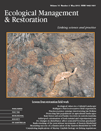
ECOLOGICAL MANAGEMENT & RESTORATION
Empowering restoration through innovative ecological insights.Ecological Management & Restoration is a premier international journal published by Wiley, dedicated to advancing the fields of ecology, environmental management, conservation, and restoration practices. With an impact factor that positions it in the Q2 category across various ecological and management domains, this journal serves as a critical platform for researchers and professionals seeking to address contemporary issues related to ecosystem health, biodiversity, and sustainable management. Covering a wide range of topics from ecological restoration techniques to policy impacts on nature conservation, the journal caters to a diverse audience and contributes to the scientific community's understanding of environmental challenges. Importantly, the journal provides significant visibility, ranking in the top percentiles within key ecological research arenas such as Nature and Landscape Conservation, reinforcing its value for researchers aiming to influence both scientific thought and practical applications in ecology and management. The journal's commitment to disseminating high-quality research makes it an essential resource for students, researchers, and practitioners dedicated to fostering a sustainable future.
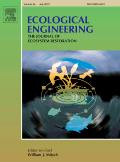
ECOLOGICAL ENGINEERING
Shaping policies and practices for ecological resilience.ECOLOGICAL ENGINEERING, published by Elsevier in the Netherlands, is a leading journal dedicated to advancing the field of environmental engineering and sustainable development. With an impressive impact factor and recognized as Q1 in multiple categories including Environmental Engineering, Management, Monitoring, Policy and Law, as well as Nature and Landscape Conservation, this journal stands at the forefront of environmental science research. It ranks among the top publications in its fields according to Scopus, reinforcing its significance with a notable position within the 90th percentile for Nature and Landscape Conservation. ECOLOGICAL ENGINEERING encourages open discourse and dissemination of innovative practices aimed at addressing contemporary ecological challenges, making it an essential resource for researchers, professionals, and students committed to sustainable practices and environmental stewardship. The journal’s comprehensive scope includes ecological restoration, habitat management, and policy implementation, ensuring a broad spectrum of relevant topics for its readership.
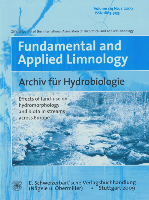
Fundamental and Applied Limnology
Discovering Biodiversity: Essential Insights for Ecological ProgressFundamental and Applied Limnology is an esteemed academic journal dedicated to the exploration of freshwater ecosystems, bridging the gap between fundamental research and practical applications. Published by E Schweizerbart'sche Verlagsbuchhandlung in Germany, this journal has been a vital resource in the fields of aquatic science and ecology since its inception in 2007. With its ISSN 1863-9135 and E-ISSN 1863-9135, it provides a platform for researchers to disseminate significant findings related to limnology, contributing to a rich understanding of freshwater biodiversity, water quality, and ecological interactions. Although currently rated in the Q3 quartile for aquatic sciences and ecology as per the 2023 rankings, it remains a valuable outlet for interdisciplinary research and practical insights, facilitating critical advancements in environmental management. Open access options enhance its visibility and accessibility, making it indispensable for researchers, professionals, and students alike who are committed to advancing the scholarship in freshwater studies. Engaging with this journal not only opens doors to the latest research findings but also fosters collaboration and innovation in the ecological community.